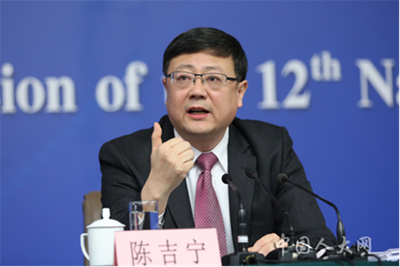


Chen Jining, Minister of Environmental Protection. (Photo source: The Web site of the National People's Congress (NPC) of the People's Republic of China)
China has made tremendous efforts to tackle environmental challenges, and it will continue such endeavors, Minister of Environmental Protection Chen Jining said on Friday.
China is entering a “second phase” in its war against pollution, during which efforts will run up against natural constraints such as wind velocity, humidity levels, and rainfall quantities, Chen explained at a press conference on the sidelines of the national legislature’s annual session.
Extreme weather in particular may offset government action, the minister pointed out, noting how the heavy smog that blanketed populous eastern and northern regions at the end of last year was caused by the El Niño effect.
Large parts of China suffered heavy smog at the end of 2015, but the situation improved in the first three months of 2016, he told reporters, noting that China is working toward a “third phase” in which its efforts will not be offset by external factors.
To better address environmental problems, China passed a new environmental protection law in 2015.
Chen stressed the importance of local governments in implementing the law. Some officials have resisted enforcement due to concerns about negative effects on economic growth in their areas.
"Only if we hold enterprises accountable for environmental responsibilities will they be more law-abiding," the minister explained.
Steps are being taken to ensure the law is strictly enforced. The ministry organized an overhaul of the government's environmental work in 33 cities in 2015, and 15 senior city-level officials were called to Beijing to discuss lackluster environmental administration.
Provincial-level governments were urged to inspect over 30 percent of the municipal governments under their administration, with officials from 31 cities summoned to explain implementation failures.A collective penalty caused by the breaking of the law was imposed in 20 cities and counties.
Chen explained that China is drafting a law allowing it to levy an "environmental tax" on its biggest polluters. The aim is not to increase the tax burden on enterprises, but to create a system that encourages them to reduce emissions, he added.
Environmental improvement and economic growth are not in opposition with each other, Chen stated, rejecting the idea that China faces a trade-off between the two.
As the Chinese economy enters a new normal and focuses more on structural reform, China is pursuing "not only economic quality, but also environmental quality, the minister said.
Pressure to boost slowing economic growth will not be allowed to undermine attempts to tackle the pollution problem, Chen noted. China seeks higher economic growth and a cleaner environment, and will not compromise on either goal.
He further pointed out that China needs to halt pollution with a systematic, scientific, and low-cost approach – and goals laid out by policymakers align with such a strategy.
“China has the confidence to accomplish its goals and provide its people with purer water, a bluer sky, and cleaner soil,” Chen pledged.
 Beautiful Kapok flowers bloom in Hainan
Beautiful Kapok flowers bloom in Hainan Eye-catching beauties in Chunxi Road of Chengdu
Eye-catching beauties in Chunxi Road of Chengdu Wedding pictures of Wu Qilong, Liu Shishi released
Wedding pictures of Wu Qilong, Liu Shishi released One of world's largest military drills in Saudi Arabia
One of world's largest military drills in Saudi Arabia Iron lady or goddess? Sportswomen's dress show
Iron lady or goddess? Sportswomen's dress show Versatile female soldiers in military camp
Versatile female soldiers in military camp Top beauties in Chinese provinces
Top beauties in Chinese provinces Follow me to my Weibo
Follow me to my Weibo Chinese ships keep close watch on U.S. Navy aircraft carrier strike group in S. China Sea
Chinese ships keep close watch on U.S. Navy aircraft carrier strike group in S. China Sea Top 20 hottest women in the world in 2014
Top 20 hottest women in the world in 2014 Top 10 hardest languages to learn
Top 10 hardest languages to learn 10 Chinese female stars with most beautiful faces
10 Chinese female stars with most beautiful faces China’s Top 10 Unique Bridges, Highways and Roads
China’s Top 10 Unique Bridges, Highways and Roads How prosperous is the city Beijing really?
How prosperous is the city Beijing really?  China will further open market for foreign firms this year: report
China will further open market for foreign firms this year: report  Influenced by Ai Weiwei, a remote village evolves into a lab for performance artists
Influenced by Ai Weiwei, a remote village evolves into a lab for performance artists  Western speech freedom not fit for China
Western speech freedom not fit for China Day|Week